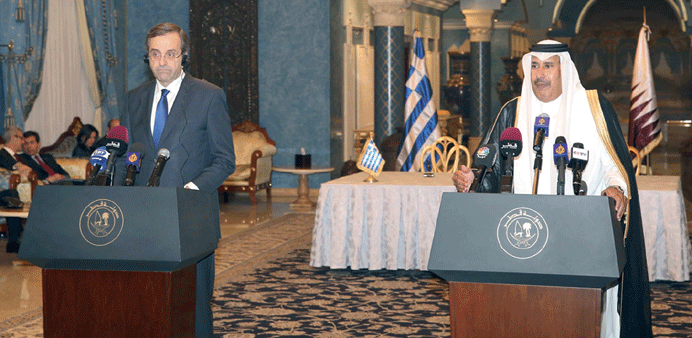Reuters/QNA, Doha
|
|
Qatar yesterday pledged to invest up to 1bn euros ($1.34bn) in Greek companies, money which could help Greece recover from its debt crisis.
The agreement was reached during a visit by Greek Prime Minister Antonis Samaras, who was accompanied by his development and defence ministers and a team of Greek business leaders.
HE the Prime Minister and Foreign Minister Sheikh Hamad bin Jassim bin Jabor al-Thani told a news conference that Qatar was prepared to put 1bn euros into a fund that would invest in small and medium-sized Greek firms, with Greece providing a similar amount to the fund.
He added that a timetable for the scheme had not been set, but that Qatar would send a delegation to Greece next month to discuss
details.
Greece plans to invite bids for some of its state companies to raise money. Asked about Qatari interest in the sales, HE Sheikh Hamad bin Jassim said: “We prefer direct government-to government relations. We think it’s quicker and more practical.”
He added: “A serious investor is hard to find today. We are a serious investor and friend to Greece. The most effective way is to make a fair, direct deal.”
The Greek investment scheme is similar to a Qatari plan to invest in Italian companies, which was announced during a visit by Italy’s Prime Minister Mario Monti to Doha last November.
Samaras had originally intended to visit Qatar in November but postponed the trip because Athens was locked in talks to obtain aid from eurozone donors.
Sheikh Hamad bin Jassim announced the signing of several co-operation agreements between Qatar and Greece. The most important of them was the agreement to establish a joint fund to invest in small and medium industries in Greece.
“We want to match the agreement for establishing the fund with what we have done with Italy a few months ago where we had agreed with them to create a joint fund with a capital of 2bn euros equally between the two countries.”
He referred to the several visits by HH the Emir Sheikh Hamad bin Khalifa al-Thani to Greece as well as his own “as part of the desire and efforts of both countries to develop and strengthen co-operation between them in various fields”.
“We have found a new thinking in Greece and co-operation with this new thinking indicates the presence of strong intention by the Greek government to deal with the State of Qatar in investment issues.”
A number of investment projects had been discussed in sectors such as utilities, infrastructure, energy and tourism, said Sheikh Hamad bin Jassim and Samaras.
Sheikh Hamad bin Jassim said that a Qatari delegation would travel to Athens in February to meet with Greek counterparts to discuss these issues.
Samaras said he wanted to make Greece a “pivotal link” between Europe and the Middle East in banking, energy and transport and construction, as fears recede of a Greek exit from the eurozone.
Sheikh Hamad bin Jassim and Samaras praised the “close relations between the two countries”, and expressed their desire to develop them further in various fields, especially in the investment domains.
They stressed that the talks that took place between them yesterday were “fruitful and included the overall relations between the two countries, especially in the investment spheres”.
The Greek prime minister said that HH the Emir Sheikh Hamad bin Khalifa al-Thani would meet him and his accompanying delegation today “to discuss bilateral issues and other topics of interest to the two countries”.
He said the agreement of establishing the Qatari -Greek investment fund was important for his country, calling on businessmen in the two countries to contribute to promoting bilateral business relations and friendship.
He praised the role played by Qatar for realising stability in the region, expressing the hope that the level of political relations between the two countries would be further expanded.
In November, the investment arm of Qatar’s sovereign wealth fund, Qatar Holding, and an investment fund backed by the Italian government agreed to invest up to 2bn euros in Italian companies over the next four years.

